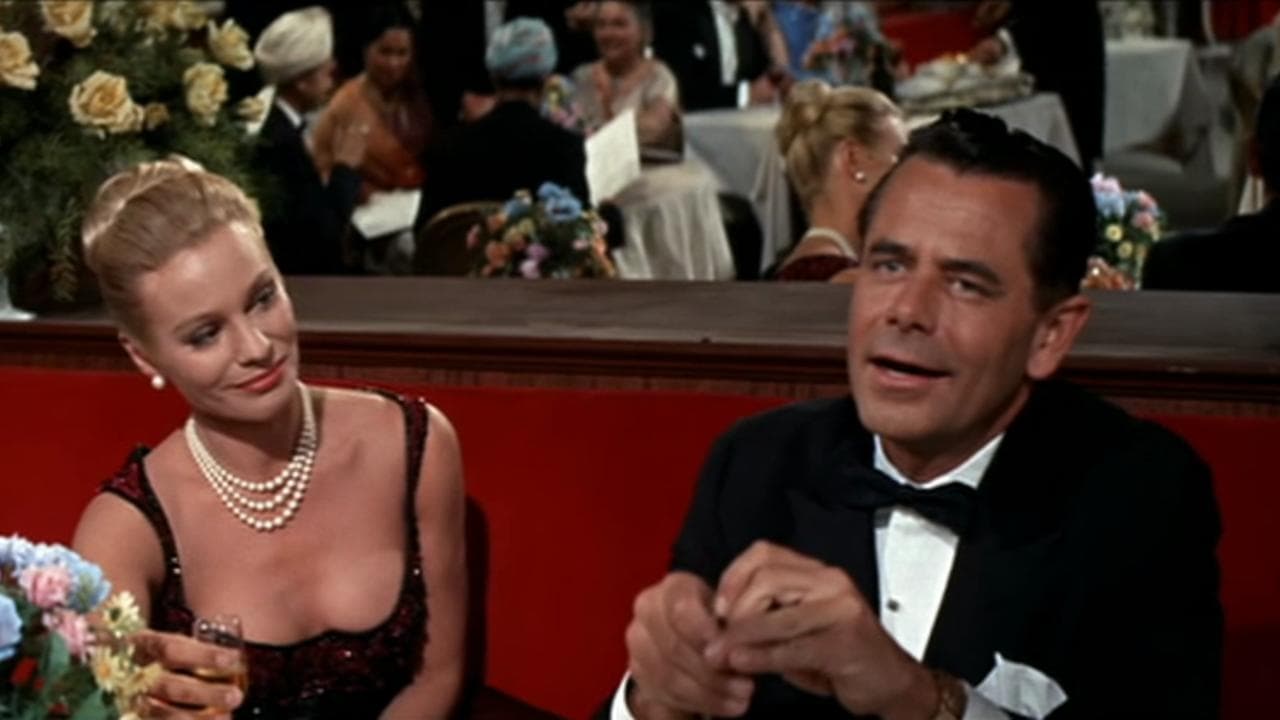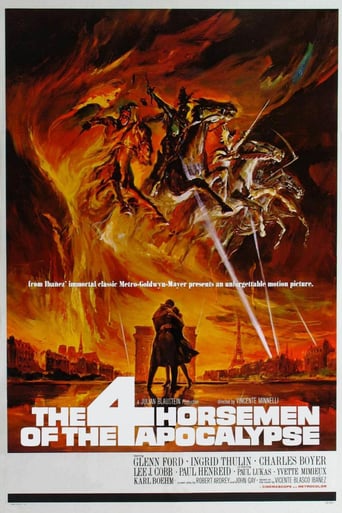

To begin with, for those who say they can't see Glenn Ford as an Argentinian, I suggest they read up on the ethnography of Argentina. Second, although it's natural to make comparisons, I am looking at this film as a solitary work of art...not as something to compare to a silent film or to a book. I let this film stand on its own.A major criticism of this film is Glenn Ford's age (46) at the time of filming. First, stars then and now often don't play characters of their real age. But beyond that, were there no rich Argentinian men who were 46 at the time of World War II? Is it impossible to show the horror of the Four Horsemen if Glenn Ford is 46 (Conquest, War, Famine, and Death)? It depended on the country and particular time period, but soldiers in their 40s were not uncommon in World War II. You are free to like or dislike this film, but this criticism in the world of cinema is not entirely valid.I was pleased that when I read the entry in Wikipedia about this film that it noted that the film has "gained some positive critical reappraisal in recent years". And well it should. This was a fairly big budget film with excellent production values. It delineates the destruction of an entire family as a result of war. Frankly, there are few war films that have accomplished that with such class.The cast is excellent. I usually find Glenn Ford an asset to almost any film, and this is one of his better performances as one of the sons of Argentina who gets caught up in a world at war. Ingrid Thulin's performance as the wife of a member of the French resistance...and lover to Glenn Ford's character...was superb; wish she had done more American films in her career. Charles Boyer was excellent as one of the old fathers; to be honest, I had forgotten that he was still appearing in films well into the 1970s...he aged well as an actor. Lee J. Cobb...well, perhaps an exaggerated performance that, although key to the story line, only extended into the first few minutes of the film. Paul Lukas was, as usual, excellent as the other old father who loses all his children to the war...he paid the price of being a Nazi officer. Yvette Mimieux had little screen time, but it was nice seeing her in a film where she wasn't playing a mentally defective person. Paul Henreid played a member of the Resistance here, and I can't honestly say he played it well. His best days as an actor were behind him.I highly recommend this film to the serious film-watcher.
... View MoreIn Argentina, the family man Julio Madariaga (Lee J. Cobb) is the patriarch of his family and considers his farm the paradise on Earth. One of his daughters, Luisa Desnoyers (Harriet MacGibbon), has married the Frenchman immigrant Marcelo Desnoyers (Charles Boyer) and they have one son, the playboy Julio (Glenn Ford), and one daughter, the gorgeous student of Sorbonne Chi Chi (Yvette Mimieux). His other daughter, Elena von Hartrott (Kathryn Givney), has married the German Karl von Hartrott (Paul Lukas), and they have three sons: Heinrich (Karl Boehm), Gustav and Franz.In 1938, Heinrich returns from Germany for a family reunion and when he tells that he has joined the SS, the displeased Julio Madariaga has a heart attack and dies. When France is occupied by the Germans, the family reunites in Paris and Franz is the Nazi administrator in France. The alienated Julio has a studio where he paints, and has a love affair with Marguerite Laurier (Ingrid Thulin), the wife of the owner of a newspaper Etienne Laurier (Paul Henreid) that is fighting in Belgium. Meanwhile Chi Chi joins the French resistance and is arrested. Julio uses the influence of his uncle Franz to release her. However, Chi Chi has an argument with Julio for his neutral position. When Chi Chi is tortured to death by Gestapo, Julio joins the resistance, using his relationship with the Germans to get inside information. "The 4 Horsemen of the Apocalypse" is an epic romance with the awakening of a playboy in times of war. The cinematography, art direction and costumes are amazing, but unfortunately the screenplay is shallow and the film is miscast in the lead role. Glenn Ford is never convincing as a French-Argentinean, and too old (46 years old) to be a playboy and son of Charles Boyer (63 years old). Further, it is ridiculous the actors and actresses speaking in English forcing accents in French, German and Spanish. I have never had the chance to see the 1921 original film to compare with this remake by Vincente Minnelli. My vote is six.Title (Brazil): "Os Quatro Cavaleiros do Apocalipse" ("The Four Horsemen of the Apocalypse")
... View MoreWhen I saw this during its first-run release, I was already an avid Minnelli fan but had been forewarned by the reviews that this was not one of his best. I recall enjoying it, nevertheless, and much of my pleasure was due to Minnelli's always inventive visual style, the expensive mounting in CinemaScope and Metrocolor, the interesting cast (not all of them well-chosen, especially the deadly-dull Glenn Ford, who was being assigned to what seemed like every other big budget M-G-M picture during that period), the astute use of Angela Lansbury to dub Ingrid Thulin's lines (though I'm sure that Miss Thulin's own voice, even if she had learned her lines phonetically, would have been preferable), and Andre Previn's very expressive score. (Mr. Previn came to disown a lot of his Hollywood work once he concentrated on conducting major classical orchestras, but I suspect he wouldn't have included this one among those he would prefer that we forget.) Tony Duquette's Four Horsemen figures are a striking addition to the lavish mounting of this production. It's not available on DVD (yet, anyway) and it's probably a safe bet that the VHS version is (ugh!) "formatted"...don't bother! You'll be missing the greater percentage of this film's achievement.
... View MoreIf Vincente Minnelli is to be praised in this film, it his decision to film Ibanez' novel and to cast the fascinating Ingrid Thulin--who has contributed substantially to Bergman's early work and to Swedish theatre. No Hollywood actress could have lent credibility to this role as Ms Thulin did. It is a matter of historical tragedy that Thulin's own voice was not used and Angela Lansbury's voice was used instead.Lee J Cobb as the patriarch and Glenn Ford as Julio were avoidable decisions. However, the casting of Paul Henreid and Charles Boyer enhanced the film.What made the film rise over mediocrity? The story and Thulin. Ibanez' work is world renowned and film is a beautiful medium to capture the image of the four horsemen. Interestingly Minnelli is not able to capture the "pale" and the "red" horse on screen--the most difficult of the four horses in technicolor and decides to use smoke and clouds to distract us. According to "The Book of Revelations," the horsemen carried a bow, a sword, a balance and a great Sword. Ingmar Bergman in "the Seventh Seal" and Minnelli transforms the great sword into a scythe. But for this detail, the art direction throughout the movie was commendable. Erich von Stroheim Jr. was a mere Assistant Director in this work. von Stroheim's body of work in Europe is revered today and one can only speculate about the result had he directed the film instead of Minnelli. Minnelli's film has its moments--Etienne meeting his wife on his return from capture, and Etienne's confrontation with Julio. Yet the film is Hollywood's attempt at presenting a narrative without complexity for audiences who prefer to be spoonfed. Ibanez' novel is still waiting for a good director to film--Minnelli stumbled in his effort to create a masterpiece. One mistake he made was choosing Glenn Ford to play an Argentinan playboy. What a costly mistake!
... View More